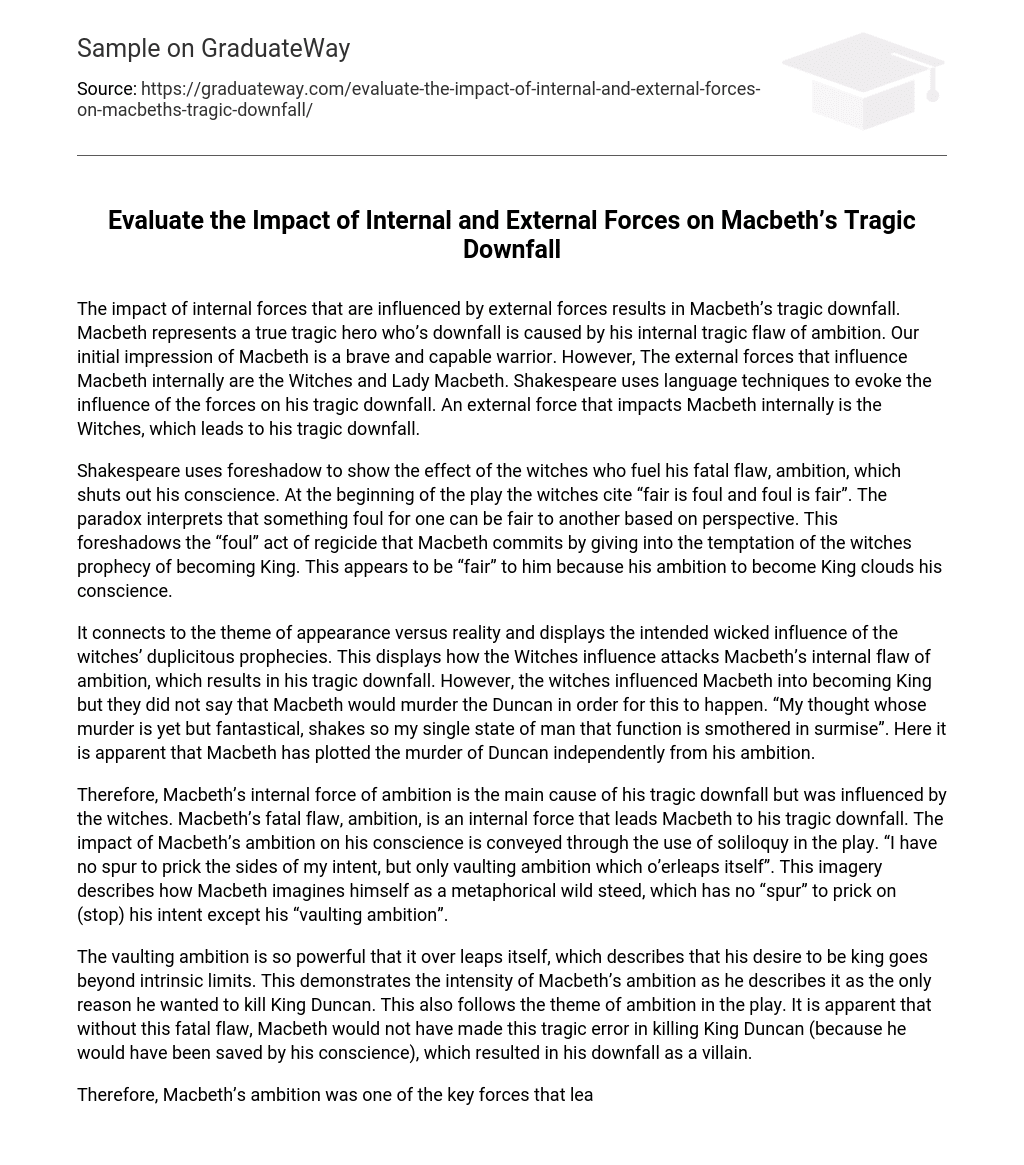The impact of internal forces that are influenced by external forces results in Macbeth’s tragic downfall. Macbeth represents a true tragic hero who’s downfall is caused by his internal tragic flaw of ambition. Our initial impression of Macbeth is a brave and capable warrior. However, The external forces that influence Macbeth internally are the Witches and Lady Macbeth. Shakespeare uses language techniques to evoke the influence of the forces on his tragic downfall. An external force that impacts Macbeth internally is the Witches, which leads to his tragic downfall.
Shakespeare uses foreshadow to show the effect of the witches who fuel his fatal flaw, ambition, which shuts out his conscience. At the beginning of the play the witches cite “fair is foul and foul is fair”. The paradox interprets that something foul for one can be fair to another based on perspective. This foreshadows the “foul” act of regicide that Macbeth commits by giving into the temptation of the witches prophecy of becoming King. This appears to be “fair” to him because his ambition to become King clouds his conscience.
It connects to the theme of appearance versus reality and displays the intended wicked influence of the witches’ duplicitous prophecies. This displays how the Witches influence attacks Macbeth’s internal flaw of ambition, which results in his tragic downfall. However, the witches influenced Macbeth into becoming King but they did not say that Macbeth would murder the Duncan in order for this to happen. “My thought whose murder is yet but fantastical, shakes so my single state of man that function is smothered in surmise”. Here it is apparent that Macbeth has plotted the murder of Duncan independently from his ambition.
Therefore, Macbeth’s internal force of ambition is the main cause of his tragic downfall but was influenced by the witches. Macbeth’s fatal flaw, ambition, is an internal force that leads Macbeth to his tragic downfall. The impact of Macbeth’s ambition on his conscience is conveyed through the use of soliloquy in the play. “I have no spur to prick the sides of my intent, but only vaulting ambition which o’erleaps itself”. This imagery describes how Macbeth imagines himself as a metaphorical wild steed, which has no “spur” to prick on (stop) his intent except his “vaulting ambition”.
The vaulting ambition is so powerful that it over leaps itself, which describes that his desire to be king goes beyond intrinsic limits. This demonstrates the intensity of Macbeth’s ambition as he describes it as the only reason he wanted to kill King Duncan. This also follows the theme of ambition in the play. It is apparent that without this fatal flaw, Macbeth would not have made this tragic error in killing King Duncan (because he would have been saved by his conscience), which resulted in his downfall as a villain.
Therefore, Macbeth’s ambition was one of the key forces that lead him to his tragic downfall. Lady Macbeth was another external force that influenced Macbeth internally, which resulted in his tragic downfall. Lady Macbeth uses her deep-seated ambition to influence Macbeth’s self during the play, which drowns out his conscience. “I would have, while it was smiling in his Have plucked the nipple from his boneless gums and dashed the brains out, had I so sworn as you have done this”.
This imagery evokes how Lady Macbeth would violently kill her own child then break the promise Macbeth made to kill king Duncan. This shows the strong ambition in Lady Macbeth that influenced Macbeth to spark desire in his own ambition. This demonstrates how Lady Macbeth fuels his ambition, which lead to his tragic downfall. Lady Macbeth also gives drowns out his conscience to make his ambition dominant internally. “When you durst do it, then you were a man”. The excerpt describes how Lady Macbeth believes that Macbeth was a man when he dared to commit regicide.
This convinces Macbeth that by not killing Duncan, he is not a man, which by his perspective makes not killing him, wrong. This reverses Macbeth’s view that in reality, the murder is a “foul” act. This shows how Lady Macbeth assures Macbeth that his act is the “fair” thing to do (referring to the witches prophecy). This follows on the theme of appearance versus reality. It also demonstrates impact of Lady Macbeth’s influence on his conscience, which becomes taken over by ambition. This leads Macbeth to his tragic downfall.





